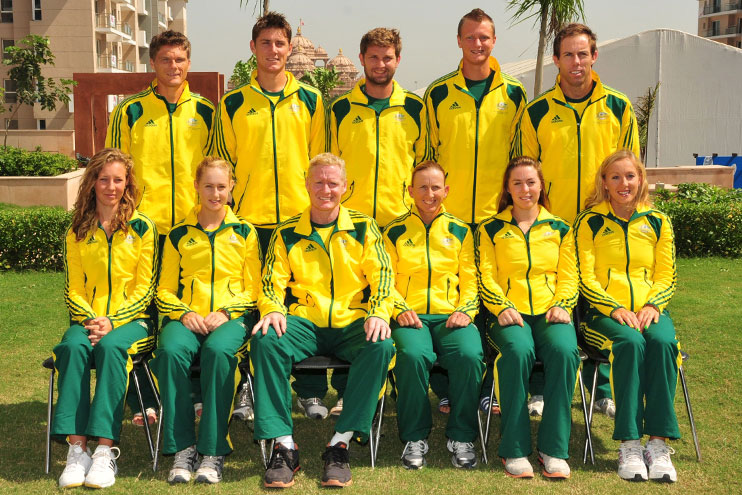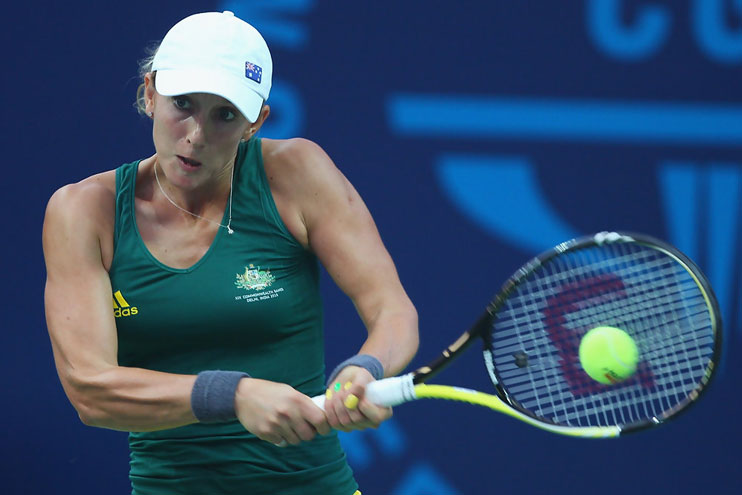
The Delhi 2010 Games saw the debut of tennis at the Commonwealth Games and remains the only time the sport has been featured on the sport programme.
Although tennis has been on the list of approved optional Commonwealth Games sports, which means the host nation of the Games can decide to feature the sport, no host nation had taken up the opportunity to serve first.
That was until the Indian officials decided to feature the sport at the Games in Delhi, given the popularity of the sport in the country.
The tennis matches were scheduled for October 4th through 10th, and the International Tennis Federation (ITF) categorised the competition as an ITF event, but the event clashed with the China Open, a sanction Association of Tennis Professionals (ATP) and Women’s Tennis Association (WTA) event, which attracted many of the Commonwealth’s top players.
Australia’s top male and female players at the time, Lleyton Hewitt and Sam Stosur, opted not to play in Delhi, giving the opportunity to eight Australian players on the rise to represent the green and gold, an opportunity the team members took advantage of.
Playing on rebound ace courts benefitted the hard-hitting Australian players who dominated the competition winning eight of the 15 medals on offer, including three gold medals, three silvers and two bronze medals.
The star of the tennis event was Anastasia Rodionova.
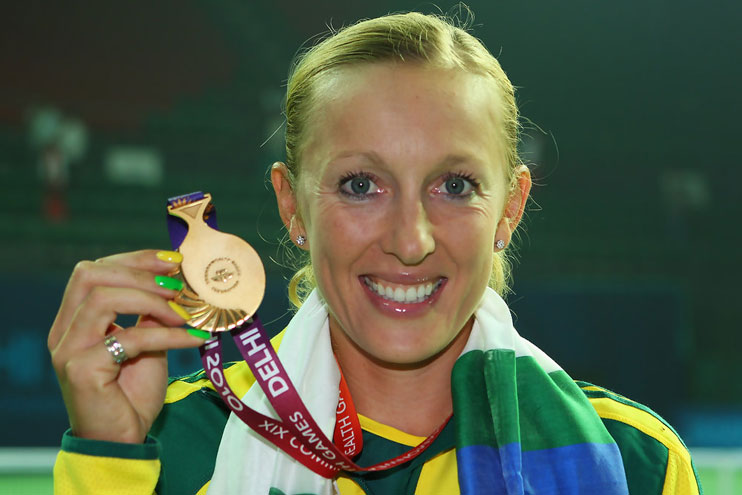
Anastasia Rodionova won the women’s singles gold medal. (CGA Archives)
Rodionova came into the 2010 Games in the best form of her career, reaching the third rounds at the French Open and Wimbledon, both career bests, and the second round at the U.S. Open. The Russian-born player who began representing Australia in 2008, was granted the number 1 seed in the women’s singles and showed why as she dominated the early rounds. But in the gold medal match, Rodionova came up against India’s Sania Mirza, and came close to defeat with growing Indian support for the home favourite, but Rodionova was able to hold her nerve and win the gold medal, 6-3, 2-6, 7-6.
The women’s doubles competition proved to be a tie between teammates, as Rodionova claimed her second gold medal of the Games when she paired with Sally Peers, who had won bronze in the women’s singles, to win the doubles event over countrywomen Olivia Rogowska and Jessica Moore.
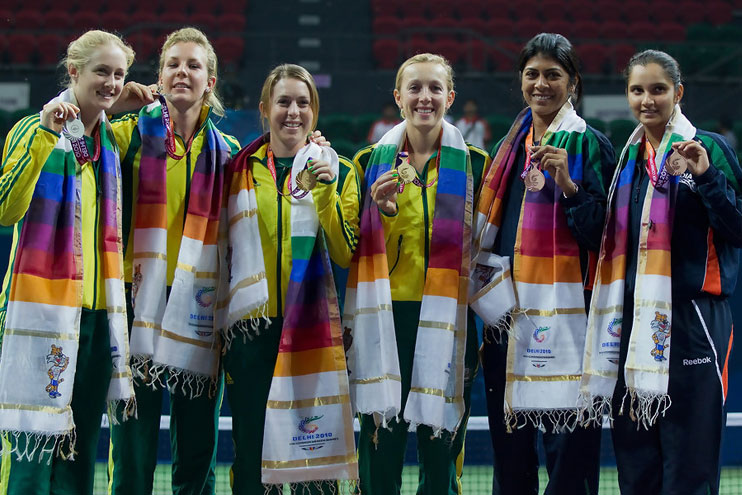
The women’s doubles final was an all-Australian affair with our teams winning gold and silver. (CGA Archives)
Peers entered the Games in 2010 as a 19-year-old but the youngster was not daunted by the moment cruising through her first two matches. She came up against Rodionova in the semi-finals and pushed her teammate to a third deciding set but lost out and went on to face Rogowska in the bronze medal play-off. After dropping the first set, Peers fought back to win the bronze medal, 4-6, 7-6, 6-3. The teenager’s path in the doubles saw her and Rodionova reach the gold medal match with relative ease, but the final was a back and forth affair where the duo defeated Rogowska and Moore 6-3, 2-6, 6-3.
Rogowska was only 19-years-old in Delhi, but after making her professional debut when she was 14, the Victorian was already a veteran heading into the Commonwealth Games in 2010. Finding good form in the lead up to the Games, after winning ITF events in Cairns in the doubles, singles in Darwin, and made the semi-finals in Alice Springs, Rogowska was a chance at the gold. Rogowska made it to the semi-finals where she came up against home country hero Mirza, pushing the Indian superstar to three sets but eventually losing out, 6-3, 2-6, 3-6, and headed to the bronze medal play-off where she lost to compatriot Peers.
Jessica Moore was the fourth female athlete at the Games, selected to play in the doubles competition, Moore partnered with Rogowska to make the gold medal match. But the Western Australian could not help the pair secure the gold medal, coming away from Delhi with the silver medal, Moore would continue playing tennis for the next decade retiring from the sport in 2020.
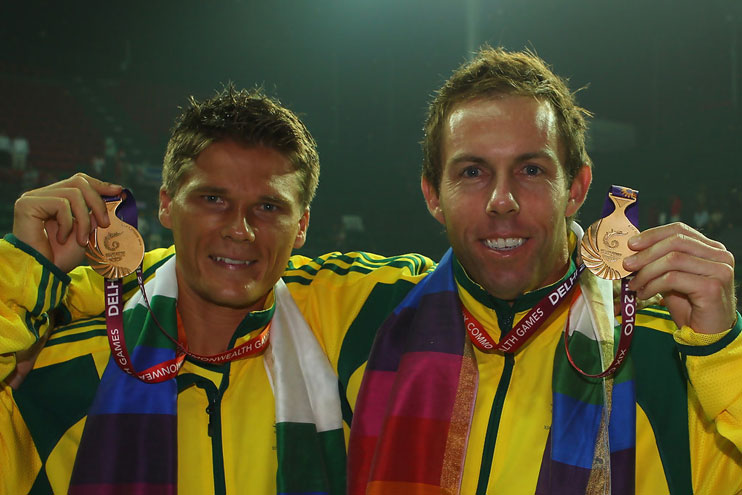
Peter Luczak and Paul Hanley won gold in the men’s doubles. (CGA Archives)
The men’s contingent was made up of four players, featuring a then 22-year old Matthew Ebden. Before later reaching his career high ranking of 39th in the world in 2018, Ebden was the 165th ranked player in the world and was using the competition in Delhi to provide himself the opportunity to develop the experience of representing his country, especially in a hostile environment. That was evident when Ebden faced local hero and number 1 seed Somdev Devvarman in the semi-finals with a packed stadium cheering against the Australian.
The youngster would battle valiantly against the Indian hero but eventually fell 3-6, 1-6 to head to the bronze medal match. Ebden would tell ABC Grandstand at the time about the thrill of representing Australia.
“An opportunity like this is unbelievable to play for my country,” Ebden told ABC Grandstand.
“Knowing that you’re playing for something bigger than yourself.
“You just keep fighting extra hard.”
On the other side of the draw to decide who would face Ebden in the bronze medal match, was an all-Australian affair between Greg Jones and the second seed Peter Luczak. Jones headed into the tournament in Delhi in the form of his career, earning the fifth seed, and the New South Welshman cruised through the early rounds without dropping a set in three games. In the semi-final, Jones was pitted against the most heralded player in the tournament Peter Luczak.
Luczak had a solid 2010 heading into the Games, reaching a career-best second round at Wimbledon and was considered a gold medal chance, but in a hard-fought semi-final against Jones, Luczak fell in three sets to head to the bronze medal match. But the Aussie youngster was too much for Luczak, as Ebden won 6-3, 6-3 to win the bronze.
Jones headed to the gold medal match against Devvarman. Battling not only the top seed but a raucous crowd, Jones couldn’t upset the Indian star going down, 4-6, 2-6, to finish with the silver medal.
The fourth men’s player on the team was doubles specialist Paul Hanley, who paired with Luczak to cruise through the early rounds of the competition before upsetting the number 1 seeded Indian pair Manesh Bhupathi and Leander Paes in the semis en route to the gold medal.
Hanley would also pair with Rodionova as the top seeded pair in the mixed doubles competition. After overcoming a scare in the semi-final against the number three seeded English duo, the gold medal match proved to be a challenge for the tandem as they were upset by an unseeded Scottish team in a hard fought final, 6-7, 7-2, 2-6. Hanley would end the Games as a dual medallist, while Rodionova would finish with three medals.
This would bring an end to the only tennis tournament so far in Commonwealth Games history where the Australian team of eight players would claim eight of the 15 medals on offer.
